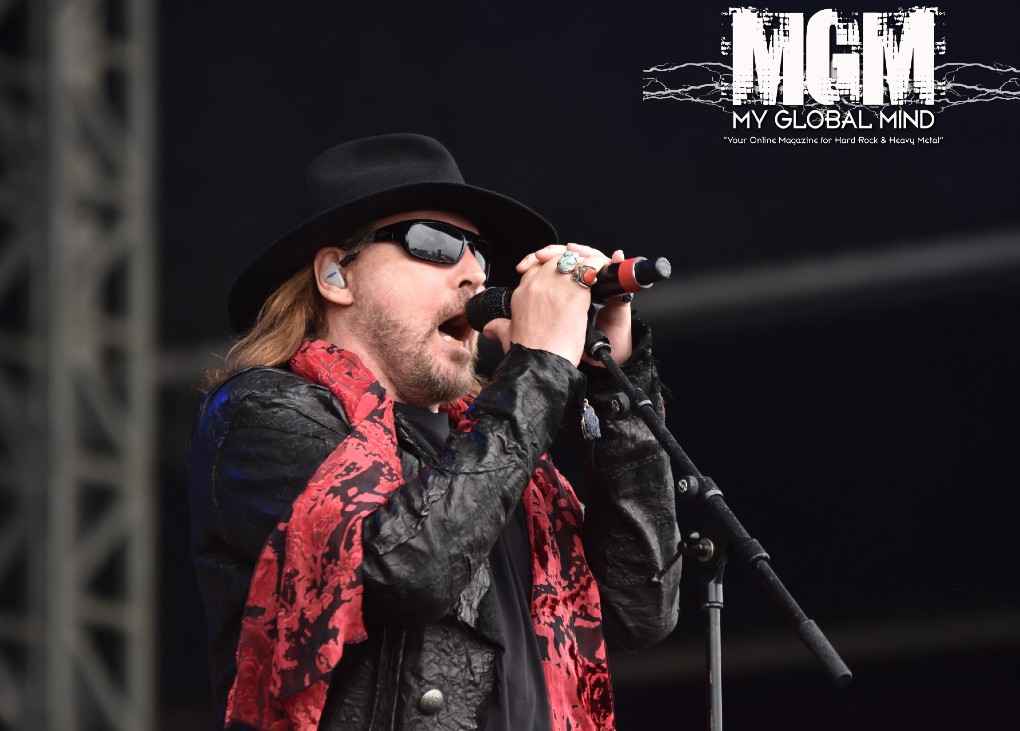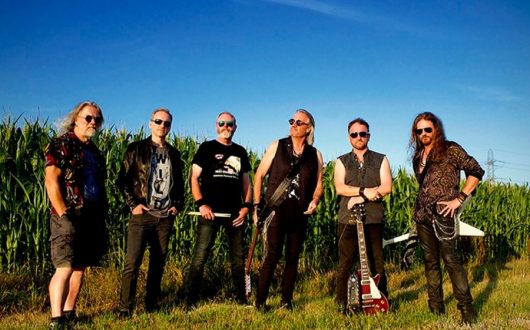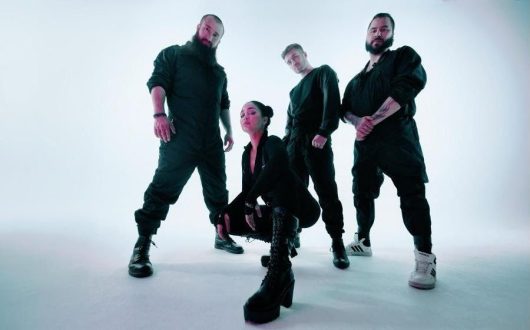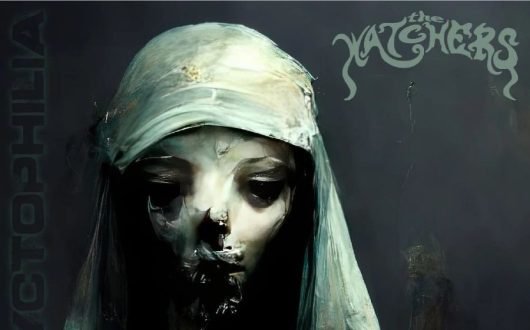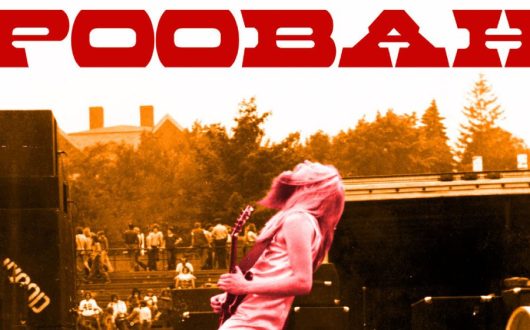Interview : Robert Cavuoto
Live Photos: Adrian Hextall
Don Dokken is one of the most recognizable names in the world of hard rock. With a career spanning more than 40 years, Don has recorded scores of albums and toured the globe with Dokken and as a solo artist.
On August 28th via Silver Lining Music, Don will release a new CD titled, Dokken The Lost Songs: 1978-1981, which features 11 songs from the vault. It was during those vital years of 1978-1981 that Don recorded these tracks before meeting with George Lynch, Mick Brown, and Jeff Pilson. Many of these demos helped ignite his career, secure a record deal, and forged a musical path like no other. The Lost Songs: 1978-1981 shows Dokken in the unfettered early days of balls-out attitude, as well as showcasing the song-writing skills which would see them sell over 10 million albums and becoming an international Rock Star. The result is an exciting look back at the genesis of Dokken.
I spoke with Don about how he came across the tapes with these old songs, the work that went into completing them, the bands who influence him at the time, and how the political unrest in this country now is influencing the writing of the next Dokken studio CD.
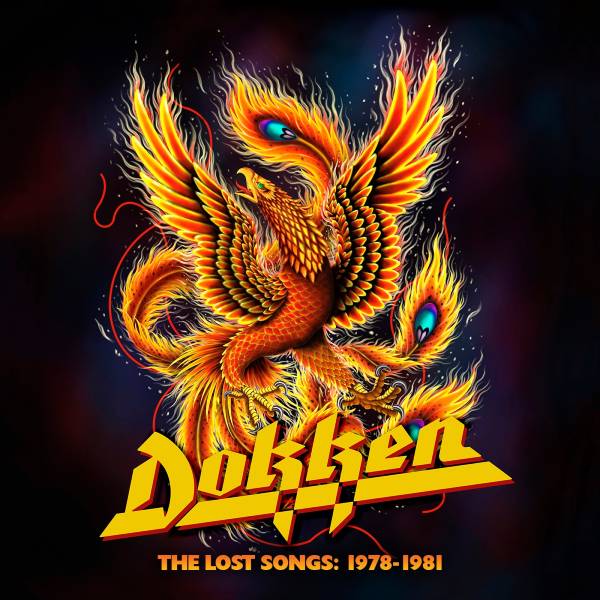
Robert Cavuoto: How have you been doing with rehab for your hands and arms post spinal surgery?
Don Dokken: I’m able to move my right arm around now, but my fingers don’t move yet. I’ve seen a little improvement, but seven months post-surgery, it’s not great, and I’m still paralyzed. My surgery was in a bad spot on my spine, C5, C6, and C7. Everybody talked about having great outcomes with their surgeries, but I wasn’t so fortunate. I tried to go to the best surgeon after meeting with two other surgeons who didn’t want to do it as they thought it was “too touchy.” That’s how serious it was. I picked the wrong guy. It was a five and a half hour surgery, and now I have 13 screws in my neck and two plates. They cut me from the back of my head to the middle of my back and severed all the nerves. My road manager had a similar surgery, and they went in through the front, and it was fine with a two-inch scar. Mine is a foot long, and I can’t turn my head, look up, or down. I can’t play the guitar, piano, use the internet, ProTool when writing songs, hold a fork, and so on. It’s very depressing. Had they gone through the front for the surgery, I could have lost my voice for a year instead of my hand. There is no physical therapy they can offer, as I have to wait for the nerves to grow back. Right after the surgery, I couldn’t use either hand, and I had to walk with a walker. Things could always be worse as I’m trying to stay positive. There is still hope as Dave Mustaine had a paralyzed arm and hand, and it came back. I miss picking up my guitar and playing acoustically. If I can’t get my hand working again, then there is nothing more I can do.
Robert Cavuoto: I’m very sorry to hear that, and my prayers are with you for a full recovery! I’m enjoying your new release, The Lost Songs: 1978-1981. Dokken has always been one of my favorite bands and this CD is a really nice time capsule of the band’s beginnings as well a magical time in the 80s. Can you tell me how this CD came about?
Don Dokken: It was all an accident. I lived in Los Angeles my entire life and decided to move to New Mexico for a change in lifestyle. I purchased a 13-acre estate far-far away from everybody. I guess you can say I have been a bit of a recluse. I was cleaning out some belongings from an old storage locker that I had for over 15 years. I hadn’t been there in five years, so nothing in there could have been too important [laughing]. My girlfriend came across all these old photos of me in the 70’s, which she put in a photo album. We tossed about 90% of the unit when we got to the last bin. It was really heavy, I opened it up, and in it were all these reel-to-reel tapes. Most were unmarked, but one of them was labeled Michael Wagener with his studio in Tennessee. It didn’t make sense as Michael is all digital now. I had a friend who still had a reel-to-reel machine, which is like an antique now. They first had to bake the tapes in an oven at a certain temperature for a period of time. Once that was done, we would only get one pass to capture what was on the tape before it would shred into a million pieces. When it was all done, and I got the recordings that were on there, I found some half-finished old songs, unfinished songs that didn’t make Breaking the Chains, and all the demos I did before connecting with George Lynch, Jeff Pilson, and Mick Brown. Some of the songs that we found were on a bootleg album that was called Back on the Streets. It was this asshole guy who stole my demos in the 80s from Germany. At the time, I didn’t think much of the bootleg, but he ended up selling 300,000 copies and made a million dollars. I talked to my record company about the bootleg and how I didn’t get royalties, publishing rights, or a dime from it. They were like, “That’s illegal, and why don’t you put out your own version of it?” I told them I didn’t have enough songs for a full album as there were only six songs. So then we started brainstorming, and I told him about the songs I found. They suggest that if I can finish those songs, I can do a retrospective CD. I didn’t want to put any songs out with George as this CD was all music before him. Then COVID hit, and I was bored, so I took the hard drive and sat with my friend, and we started going through all songs as well as the bits and pieces of songs.
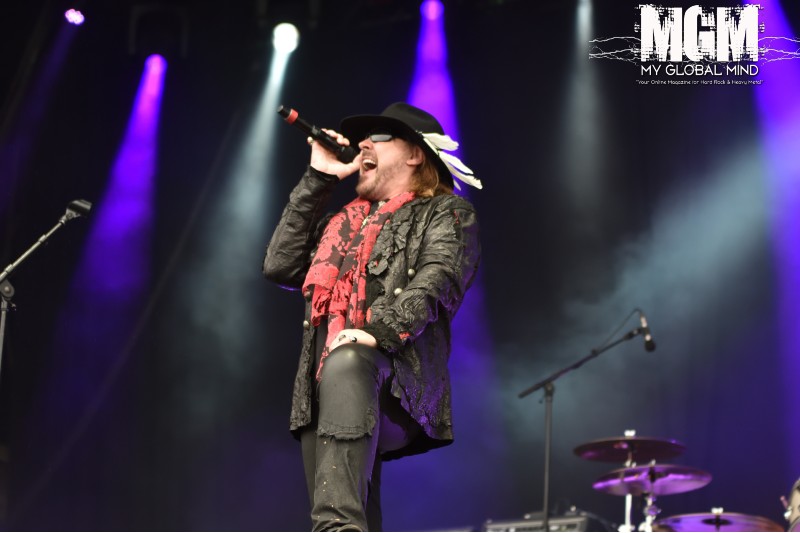
Robert Cavuoto: What was involved in finishing these songs so they could be released?
Don Dokken: I asked Jon Levine and my engineer about them, as some songs only had me singing one verse with a cheesy drum machine. We put our heads together, and I sent some of the songs to BJ Zampa in Connecticut to add real drums. Then Jon put the solos on, and slowly we started to get them done.
Robert Cavuoto: You guys did an outstanding job in production; sonically they sound authentic to the time period.
Don Dokken: Jon could have easily redone all the guitars, but I wanted to leave it as is because that is how you played back then. We could have made the unfinished songs super hi-fi modern, but they wouldn’t have fit with the old songs which weren’t hi-fi. When we were done mixing the songs, if this makes any sense, they sounded too good. We had to go back and make them a little more retro-sounding because it makes the other songs sound even worse. We spent months mastering and re-mixing them going for that old drum and snare sounds to keep it authentic. With so much technology, you could make everything sound like the second coming of Christ. I heard that a few of the songs were floating around the internet and found some on YouTube like my original single “Hard Rock Woman” and “Broken Heart.” They sounded terrible, like a copy of a copy of a copy that people re-downloaded over the last 35 years. Through an act of God, I was doing an interview with a guy from Sweden Rocks and brought this up to him, and he said he had an original copy of that 7″ single. He told me that a friend of his saw me play on my first tour in 1979 in Berlin and he bought a few copies of the single that I was selling at the show and gave one to him. I asked him if I could get a copy as it would help me out as I didn’t even have a copy. He dug through his collection and after a week, he emailed me the music files. So that’s the strange story of how I came across a better version of all the stolen songs.
Robert Cavuoto: You mentioned that you didn’t include any songs with George on them.
Don Dokken: We wanted to put out something from the original Dokken days before George and the other guys joining the band. I have tons of songs that were left over from those days! This had nothing to do with George, Jeff, or Mick; it was just from a different era of the band.
Robert Cavuoto: I ask because it sounded like George was playing on the song “Rainbows.”
Don Dokken: That was me on guitar, and Jon went in and added the lead.
Robert Cavuoto: Can you recall if there were any bands in Hollywood at the time who influenced you when writing these songs?
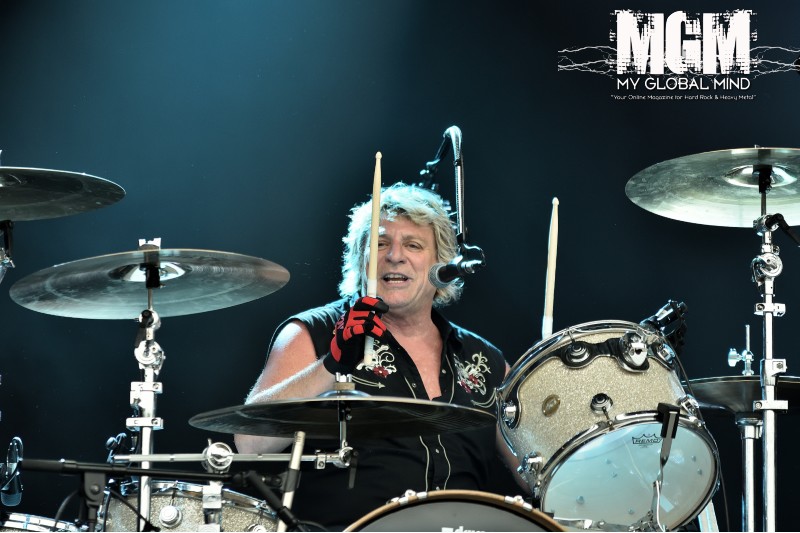
Don Dokken: Van Halen mostly as we were playing the Whiskey in Hollywood with them. When I first saw Van Halen, my jaw dropped. They were doing something new. David Lee Roth was a flamboyant singer and different from the way people were performing at the time. I was also listening to Y&T at the time. When I was writing a lot of these songs I wasn’t listening to American hard rock as there wasn’t a lot of it back then, I was listening to British bands like Saxon, Accept, and Judas Priest’s Sad Wings of Destiny. All those bands came out in the 70s!
Robert Cavuoto: How would you describe your songwriting evolution from those songs to now?
Don Dokken: I guess my guitar chops got a lot better. I was 25 or 26 years old at the time and never made a record before, so a song like “Hard Rock Woman” was the first time I ever stepped foot in the studio. I had no clue what I was doing. Thank God I had Drake Levin from Paul Revere and the Raiders in there with me as he was a famous guitar player back then. Drake also filmed a video of me with the original Dokken line-up on the two songs off the single. I’m trying to get hold of Drake’s wife to see if she may have a copy since he passed away. We would like to put it out as a bonus. I haven’t seen it in 40 years.
Robert Cavuoto: Your first solo CD, Up From The Ashes, is phenomenal and one of my favorite CDs of yours. Why do you think it didn’t get the notary and accolades it deserved?
Don Dokken: I called that my tragic record as it is probably one of the best things I have ever done. The line-up was Peter Baltes from Accept, Mikkey Dee from King Diamond, John Norum from Europe, and Billy White. We spent a lot of time on it, and the record company was behind it. I honestly think it wasn’t a huge hit because the three members of Dokken took me to court to prevent me from using the name Dokken for five years. It wasn’t a solo record; it was supposed to be a Dokken record. So that was depressing. When you have an album with your surname, people don’t gravitate to it. They perceive it as a knock off or spin-off, and it hurts the record. It’s not the Eddie Van Halen Band, or the Rob Halford Judas Priest Band, and Jon Bon Jovi is not the same as Bon Jovi. Also, two months after that record came out, Guns ‘N Roses and Nirvana both came out with their records on the same label, and that put a stop to ours. Both bands introduced new sounds and the Seattle scene was exploding. Here I am putting out a straight-up, hard rock, quasi Dokken album. That music was dying out. I blame the musicians on The Hollywood Strip because things got so watered down that the focus was on looks, make-up, hair, and cheesy songs. I think people got burned out and didn’t want to hear “Unskinny Pop” anymore. They wanted to hear songs with substance. Kurt’s lyrics were deep.
Robert Cavuoto: There isn’t a bad song Up From The Ashes.
Don Dokken: Thanks. I’m proud of it. Mikkey called me the other day, and we talked about the Scorpions having to cancel their tour. Mikkey and his wife actually came down with the Coronavirus in Australia and were sick for weeks. He said he lost 35 pounds from it. He said he’s all better now and was in a club in Guttenberg, and they were playing Up From The Ashes. He told me it was one of his favorite records as well. We had high hopes for that record. We played to 2,500 seat sold-out shows and the record went to 400,000 in sales. Unfortunately, the label pulled the plug on it because Nirvana and Guns took off. Had we called it Dokken, I’m pretty sure it would have gone platinum.
Robert Cavuoto: You have some social distance shows coming up. What does that mean for the fans?
Don Dokken: I don’t think it means anything! How are you going to get 2500 people to stay six feet apart from each other at these outdoor venues? It’s impossible. The Governor of Arkansas said he would let the outdoor venues open up. We are not doing any Meet and Greets or shaking hands with fans. We have to be safe as well as on the plane. They allowed both of the shows to be a half-filled capacity. They are both 5000 seat venues, so they will only let in half. I keep thinking any day I’ll get a call that the shows have been canceled. Look at what is happening now, COVID is spiking because of all these protests and demonstrations with 10,000 people marching arm-in-arm. If this continues, they will cancel these fucking shows.
Robert Cavuoto: I understand that you are working on a new Dokken CD, and knowing that you typically write from the heart, will you be singing about what is going on in our country with the election, the protests, and pandemic?
Don Dokken: We are about halfway done with the record, and a lot of my lyrics are about what is going on now. Whether you are a fan of Trump or not, I see him as a little unhinged and trying to take over the planet, so I wrote a song called “Hail to the King,” about him. He has a king mentality. I’m not a political person at all; I don’t get involved in politics but when you see the craziness of the government and the guy firing his people daily like the Attorney General, and the Prosecutor it’s bizarre [laughing]. I wrote a tongue-in-cheek song about a guy who is running the country and feels he has no limitations or rules. That he can do whatever he wants like a king. I wrote another song about the insanity of these demonstrations. People have the right to march and protest the George Floyd situation, but you get these people who use it as an opportunity to rob and loot. They don’t care about George Floyd; they just want to go down there with a hammer and bust out windows to grab TVs, so I wrote a song called “Rampage.” They are thugs, gang bangers, and crooks who want to take advantage of the situation while the police are doing their best to keep the crowds under control.
https://smarturl.it/DokkenTheLostSongs
